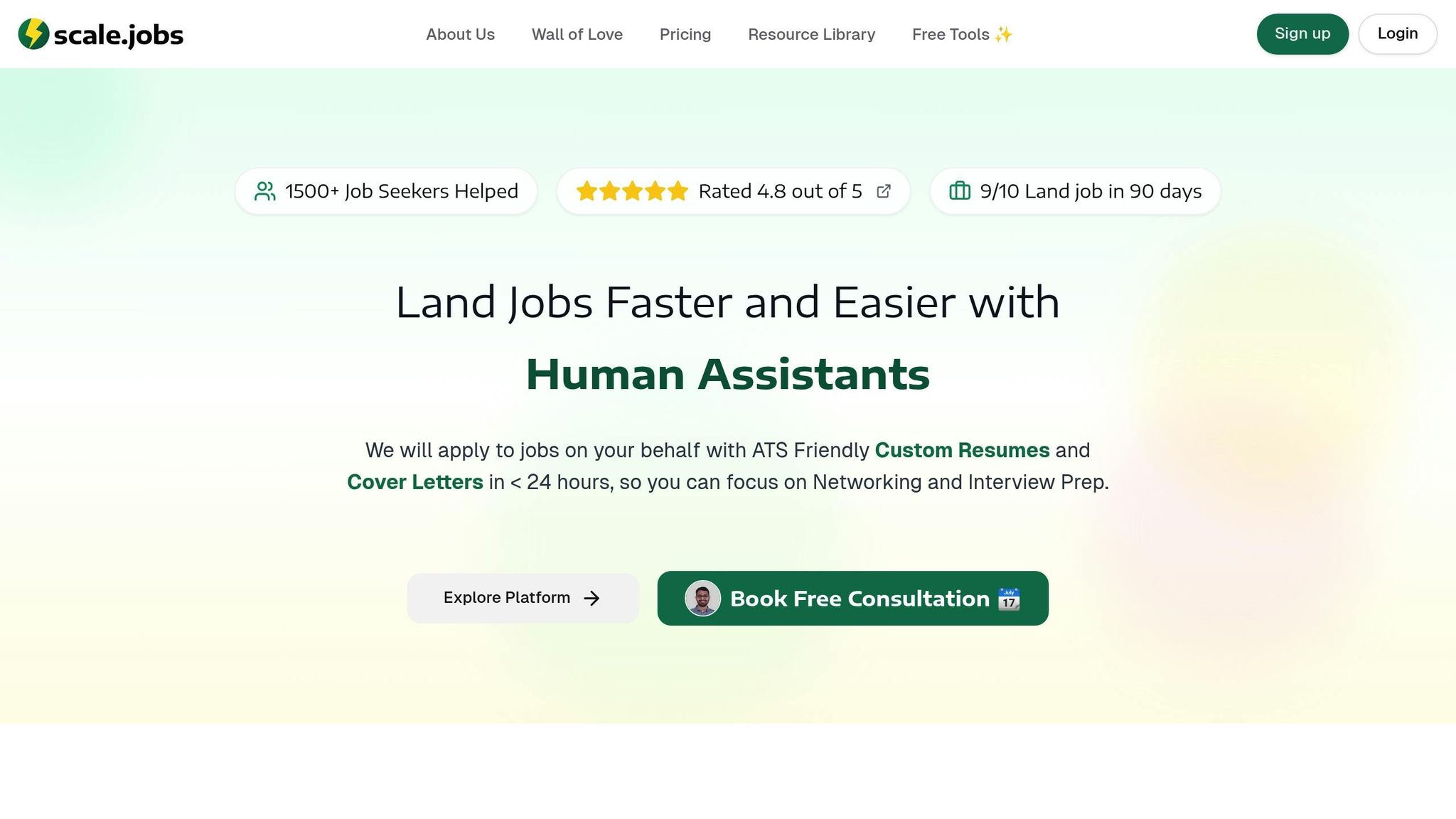How to Find and Keep a Career Mentor
Learn how to effectively find and maintain a career mentor to enhance your professional growth and achieve your career goals.

Looking for a career mentor? Here's what you need to know:
- A mentor offers guidance, industry insights, and access to networks, helping you grow professionally.
- Start by clarifying your career goals and identifying your skill gaps - this ensures you find the right fit.
- Use your network, online platforms like LinkedIn, or structured programs to connect with potential mentors.
- Build a strong relationship by setting clear expectations, preparing for meetings, and maintaining regular communication.
- Tools like scale.jobs can simplify the process by saving you time on networking and job applications.
Key takeaway: A good mentor can shape your career, but success depends on your effort to build and sustain the relationship.
My exact steps to find a great mentor...don't make THESE mistakes
Understand Your Mentorship Needs
Before reaching out to a potential mentor, take the time to pinpoint exactly what you’re looking for. A mentorship without clear goals can feel aimless, so start by defining your career vision. This will help you identify any gaps and guide you toward choosing the right mentor.
Define Your Career Goals
Get specific about where you want to go in your career. What role do you see yourself in? What timeline are you working with? What kind of impact do you want to make in your industry? Setting clear, measurable goals - both short-term and long-term - can give your mentorship a solid direction. The SMART framework (Specific, Measurable, Achievable, Relevant, Time-bound) is a great tool for this.
For instance, instead of saying, "I want to move up in my career", try something like, "I want to land a senior marketing manager role at a Fortune 500 company within 18 months."
Here’s another example: a mentee might aim to publish two articles within two years, dedicate one session per week to specialized training, and schedule biweekly meetings with their mentor to work on career strategies.
It’s not just about job titles, though. Your goals could include financial milestones, such as earning a specific salary increase in five years, or networking objectives, like connecting with a set number of industry professionals this year.
Identify Skills or Knowledge Gaps
Take a hard look at where you stand. Compare your current skills and experience to what’s expected in the roles you aspire to. Job postings and conversations with people already in those positions can provide valuable insights.
Don’t stop at self-assessment - seek feedback from colleagues, supervisors, or peers. They might point out areas for improvement that you hadn’t considered.
Also, keep an eye on where your industry is headed. Focus on building skills that will be relevant in the future, and don’t overlook the importance of leadership and communication abilities. These often become critical as you climb the career ladder.
Decide on the Type of Mentorship
The kind of mentorship you need will depend on where you are in your career. Early-career professionals might benefit from technical guidance or coaching to build foundational skills. Mid-career individuals often need a broader perspective, focusing on strategic thinking and decision-making. For high performers, mentorship might look more like sponsorship, where a mentor actively champions their growth and opens new opportunities.
Think about how you learn best. Would you thrive with one-on-one mentorship, or would group mentoring fit your needs better? Do you prefer a structured approach or something more flexible?
Consider your specific challenges, too. Are you navigating a career change, trying to break into a new field, or aiming to excel in your current role? And don’t forget to evaluate how much time you can realistically commit to this process.
Here’s a compelling reason to invest in mentorship: studies show that 94% of employees would stay longer at a company that supports their career development. Plus, 9 out of 10 workers with a mentor report job satisfaction. By clarifying your goals, identifying your skill gaps, and understanding your learning style, you’ll be in a strong position to find a mentor who aligns with your aspirations.
How to Find the Right Career Mentor
Once you’ve identified your career goals and the areas where you need support, it’s time to start searching for a mentor. Your existing network, online platforms, and structured programs are excellent places to begin.
Use Your Professional Network
Your current connections are often the most natural starting point. People who already know you - whether they’re colleagues, past managers, alumni from your school, or friends in your industry - are more likely to take an interest in your growth or introduce you to someone who can help.
Start by reaching out to these contacts. Share your career aspirations and ask about their own journeys. These conversations can lead to deeper discussions about mentorship. If someone seems like a good fit but can’t commit to mentoring, ask if they can connect you with someone in their network who might be able to help.
Attending events is another way to expand your circle. Industry conferences, professional meetups, alumni gatherings, or even informal networking events can introduce you to experienced professionals. Focus on building authentic relationships - mentorship often grows out of genuine connections.
Remember, it’s not just about what you can gain. Look for ways to offer value in return, whether it’s sharing insights, helping with a project, or providing introductions within your own network.
Search Online Platforms
LinkedIn is a powerful tool for finding mentors. Use its advanced search features to narrow down professionals by industry, company, title, or location. Look for individuals who are a few steps ahead in their careers - they’re often in the best position to guide you and understand the challenges you’re navigating.
Pay attention to those who actively share insights, comment thoughtfully, or publish articles. Their activity can give you a sense of their expertise and interests, making it easier to craft a personalized outreach message.
Beyond LinkedIn, platforms like MentorCruise and ADPList are designed specifically for mentorship. These sites provide detailed profiles, availability schedules, and communication tools to make the process more straightforward.
Join Structured Programs
If your network or online searches don’t yield results, structured mentorship programs can be a great alternative. Many companies have internal programs that pair employees with senior leaders for regular guidance and training. If your workplace doesn’t have one, consider suggesting the idea to HR or your manager.
Professional associations in your field often run mentorship initiatives as well. For example, groups like the American Marketing Association or Project Management Institute provide matching services and resources to support both mentors and mentees.
Don’t overlook university alumni networks. Many schools have formal programs where alumni volunteer to mentor current students or recent graduates. Additionally, community organizations and non-profits - such as SCORE for entrepreneurs or Women in Technology groups - frequently offer mentorship opportunities.
Write the Perfect Outreach Message
Your first message to a potential mentor is crucial. It’s your chance to make a strong impression and open the door to a meaningful connection. Personalize your message by using their name and referencing a recent accomplishment or shared interest. Briefly introduce yourself, explain why you’re reaching out, and suggest a short call to discuss your goals.
Keep your message clear and concise. In just a few paragraphs, you should cover who you are, what you’re seeking, and how you believe they can help. Highlight what you can offer in return - whether it’s insights, collaboration, or introductions. Tailor your message by referencing their recent posts, articles, or professional achievements.
Be mindful of their time and flexible about how they’d like to structure the mentorship. Some may prefer informal chats over coffee, while others might suggest regular check-ins or introduce you to someone else who’s a better fit.
End your message with genuine appreciation and a clear next step. Instead of directly asking, “Will you mentor me?” try something like, “Would you be open to a quick 15-minute coffee chat to discuss my career goals and hear your perspective?”
The best mentors are those who listen deeply, offer thoughtful advice, and genuinely want to see you succeed. Building a strong relationship with the right mentor can be a game-changer for your career.
Building a Successful Mentor Relationship
Creating a meaningful mentor relationship takes effort, clear communication, and a shared commitment to growth. The foundation rests on mutual respect and a willingness to stay engaged.
Set Clear Expectations
Use your first meeting to lay the groundwork for your mentorship. Decide how often you'll meet - weekly, bi-weekly, or monthly - and agree on the best ways to communicate. Be honest about your goals and ask your mentor about their expectations too. As a mentee, it's important to share your priorities and revisit these as the relationship progresses. Once you've set these clear expectations, show your dedication by being thoroughly prepared for every interaction.
Be Prepared and Take Initiative
Preparation is key to making the most out of your mentorship. Before your first meeting, send your mentor a concise resume and a summary of your work so they have a clear picture of your background. Take time to research their professional experience to understand their expertise. Additionally, draft and share an agenda that highlights your goals and discussion topics ahead of time.
For every meeting, come ready with updates, challenges, and specific questions. Be proactive by sharing actionable items and focusing on clear discussion points. After each meeting, send a thank-you note summarizing key takeaways and outlining the next steps. Keep track of your progress and the advice you receive. Scheduling meetings in advance is another way to show respect for your mentor's time and commitments.
Focus on Mutual Growth
Openly share both your successes and challenges to create a space for mutual learning. This approach not only strengthens the relationship but also sets the tone for a mentorship that grows and evolves over time.
Use Tools to Find Mentorship Opportunities
Today's job search platforms make finding a mentor easier by automating outreach and providing tools to help you connect with industry professionals. Let’s take a closer look at how scale.jobs simplifies this process and supports your mentorship journey.
How scale.jobs Can Help You Connect

Scale.jobs offers a combination of free networking tools, AI-powered assistance, and human-powered job application services, saving you over 20 hours each week. That extra time can be spent building meaningful professional connections and advancing your career.
The platform's free tools help you identify potential mentors within your field, while its AI assistant creates personalized messages to reach out to them. What sets scale.jobs apart is its flat-fee human assistant service, which handles everything from crafting ATS-friendly resumes to submitting job applications. Unlike subscription-based platforms, scale.jobs eliminates recurring costs and offers real-time updates, including proof-of-work transparency.
For recent graduates and immigrants dealing with visa complexities, scale.jobs provides tailored support to navigate the challenges of building a professional network while managing job applications. Plus, its unused-credit refund policy ensures you only pay for services you actually use, making it a smart choice for job seekers focused on maximizing their networking opportunities.
By combining technology, AI, and human expertise, scale.jobs allows you to focus on building authentic mentorships instead of getting stuck in the administrative grind of job hunting.
Comparison of Networking Tools
Not all platforms are created equal when it comes to mentorship and networking. Here’s a comparison to help you decide which tool aligns best with your goals:
| Platform | Mentorship Features | Networking Tools | Human Support | Pricing Model | ATS Tools |
|---|---|---|---|---|---|
| scale.jobs | Human-powered outreach, networking tools, time-saving automation | Yes (free) | Yes (trained VAs) | Flat-fee & free options | Yes (free) |
| TealHQ | Community forums, job tracking focus | Limited | No | $9/month subscription | Yes |
| Wonsulting | Direct career coaching, webinars | Limited | Yes (coaches) | $49+/session | Yes |
| Jobscan | Resume optimization only | No | No | $49.95/month | Yes |
TealHQ is primarily designed for job tracking but lacks robust networking tools. Wonsulting offers career coaching, though its services come at a higher cost per session. Jobscan specializes in resume optimization but doesn’t provide networking features, requiring you to use additional platforms for mentorship and connections.
In contrast, scale.jobs delivers a comprehensive solution, combining networking tools, application management, and human support in one place. Its transparency features - like real-time updates and proof-of-work screenshots - ensure you know exactly how your resources are being used to further your career.
A 2023 LinkedIn survey revealed that over 70% of professionals credit their career success to having a mentor or a strong professional network. Additionally, a 2024 study by the National Mentoring Partnership found that mentored employees are promoted five times more often than their non-mentored peers.
These findings highlight the importance of tools that go beyond just managing job applications. Platforms like scale.jobs take care of the administrative load, allowing you to focus on the relationship-building that drives long-term career success.
Maintaining Your Mentorship Over Time
Keeping the connection alive as your career evolves is where the real magic of mentorship happens. Studies show that 90% of people with mentors report being happier at work, and the average mentor-mentee relationship lasts about 3.3 years. The following steps build on earlier strategies to help ensure your mentorship stays meaningful and aligned with your career goals.
Schedule Regular Check-Ins
Consistency is the backbone of any strong mentorship. Madison Frees, Partnerships Coordinator at Terkel, highlights the importance of communication:
"Open and honest communication is key to strengthening the relationship so both sides get the most out of the relationship."
This means going beyond the occasional meeting to maintain an ongoing dialogue.
Evan Reed, Category Development Associate Manager at The Wonderful Company, adds:
"Maintaining a schedule is one of the first things that shows that both parties are serious about investing in each other in a mentor/mentee relationship."
To stay on track, use calendar tools to schedule recurring check-ins - like monthly coffee chats or quarterly video calls. This ensures the relationship doesn’t lose momentum. Keep the communication flowing between meetings by sharing updates, wins, and challenges through your preferred platform. These consistent touchpoints show your mentor that their input matters to you.
Alison Stine, Founder of Stine Wealth Management, underscores this point:
"An open and active line of communication will help to strengthen the relationship and hopefully help it to last longer."
This steady communication builds trust and lays the groundwork for constructive feedback.
Accept and Use Feedback
Feedback is where growth happens, but it requires the right mindset. Think of feedback as a gift - your mentor is sharing their time and expertise to help you improve. Listen carefully, even if the feedback feels uncomfortable, and take a moment to summarize their points to ensure you’re on the same page. Don’t hesitate to ask questions to clarify what they mean.
Interestingly, research suggests that people need about three times more positive feedback than negative feedback to thrive. So, while constructive criticism is important, don’t let it overshadow the affirmations. Take notes during feedback sessions and focus on one specific behavior to adjust. Create a small, measurable goal based on their advice, and follow up with updates on your progress. This not only shows that you value their guidance but also demonstrates your commitment to growth.
A simple thank-you note or a quick message about how their advice has helped can go a long way in strengthening your bond. Regularly reflecting on their feedback will also help you keep your mentorship aligned with your changing goals.
Review and Adjust the Relationship
As your career grows, your mentorship should evolve too. While most mentoring relationships start with a clear goal, they need to adapt as your needs and circumstances change. Regular reviews can help keep the partnership relevant.
Schedule six-month check-ins to evaluate your progress and reassess the focus of your mentorship. Look at what’s working, what needs tweaking, and whether new challenges or opportunities have emerged. Use tangible indicators like new skills, career milestones, or a broader professional network to measure success.
As your career advances, you might find that your needs shift. A mentor who guided you early in your journey may not fully address the demands of a senior role. This doesn’t mean the relationship has to end - it could simply mean adjusting how often you meet or focusing on different topics. You might also consider finding additional mentors who can provide expertise in specific areas, while still keeping your original mentor for strategic advice.
Flexibility is key. Life and work circumstances can change, and your mentorship should adapt accordingly. Remember, mentorship is a two-way street. As you gain experience, think about how you can offer value to your mentor. This could mean sharing industry insights, making introductions, or helping with projects. By staying intentional about communication, feedback, and regular reviews, you’ll build a mentorship that supports your career growth at every stage.
Conclusion: Making the Most of Mentorship
Finding and maintaining a career mentor goes beyond mere networking - it's about forming a partnership that drives your professional growth. In fact, 75% of executives attribute their success to mentorship[1]. Even more striking, employees involved in mentoring programs are promoted five times more often than those who aren't[2].
To get the most out of mentorship, start by clarifying your goals and identifying areas where you need guidance. The best mentors aren’t always high-ranking executives; often, they’re individuals with relevant, up-to-date experience who can offer practical advice tailored to your situation.
Building a strong mentor-mentee relationship takes effort. Set clear expectations from the beginning, come prepared to meetings, focus on mutual growth, and keep communication consistent. As your career evolves, so should your mentorship. Be open to feedback and adjust your approach to reflect your changing needs. Incorporating the right tools can also help you stay on track and make the relationship even more impactful.
Technology can play a key role in enhancing mentorship. Platforms like scale.jobs simplify networking and job applications by offering free tools, AI-crafted documents, and support from human assistants. These resources can help you connect with potential mentors and monitor your progress effectively.
Don’t wait - take action now. Reflect on your career goals, identify potential mentors, and send a personalized message to schedule your first meeting within the next two weeks. This small but decisive step can lay the foundation for a mentorship that supports your long-term growth.
Mentorship isn’t a one-off event; it’s an ongoing commitment to your career development. By approaching it with purpose, preparation, and the right resources, you’ll cultivate relationships that offer guidance, open doors, and propel your career forward for years to come.
FAQs
What’s the best way to ask someone to be your career mentor without coming across as pushy?
To approach someone as a potential career mentor without coming off as pushy, focus on building a genuine connection first. Instead of outright asking them to be your mentor, start by seeking their advice on a specific issue or challenge they’re well-versed in. This approach feels more natural and less formal.
Share why you respect their expertise and explain how their perspective could help you with your goals. Be upfront about what you’re hoping for - whether it’s occasional advice or guidance on a particular decision - and make it clear that you value their time and insights. Keeping things casual and open-ended shows respect and makes it easier for them to say yes.
By beginning with smaller, meaningful interactions, you can naturally develop the relationship into a mentorship over time.
What mistakes should I avoid to build a strong, lasting mentorship relationship?
To create a mentorship relationship that thrives over time, it's important to sidestep a few common missteps:
- Unclear goals and expectations: When both parties aren't on the same page about objectives, the mentorship can lose direction and purpose.
- Inconsistent communication: Skipping regular check-ins can weaken the connection and stall progress.
- Mismatch between mentor and mentee: Differences in values, goals, or communication styles can make the partnership less effective.
It's also crucial to address warning signs like advice that feels unhelpful or manipulative behavior. Prioritize open communication, establish shared expectations, and ensure the mentor-mentee pairing aligns well to build a lasting and productive relationship.
How can I evaluate the success of my mentorship and know when to consider finding additional mentors?
To determine if your mentorship is on the right track, consider whether it’s helping you move closer to your personal and professional goals. Signs of a thriving mentorship include hitting important milestones, sharpening your skills, and gaining confidence. If you’re seeing steady progress and feeling well-supported, it’s a good indication that the mentorship is working effectively.
On the other hand, if your development has plateaued or your goals seem out of reach despite ongoing efforts, it might be time to explore additional mentorship opportunities. A new mentor can bring in fresh ideas, specialized knowledge, or insights in areas where your current mentor might lack expertise. Mentorship isn’t a one-size-fits-all journey - it’s a flexible process. Having more than one mentor can expand your network and provide diverse guidance to help you grow in multiple directions.




